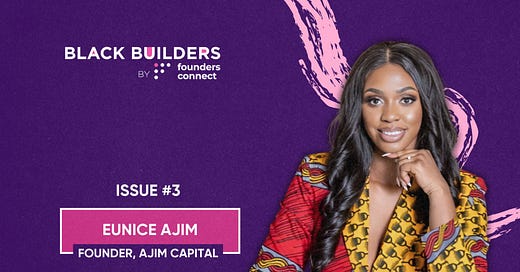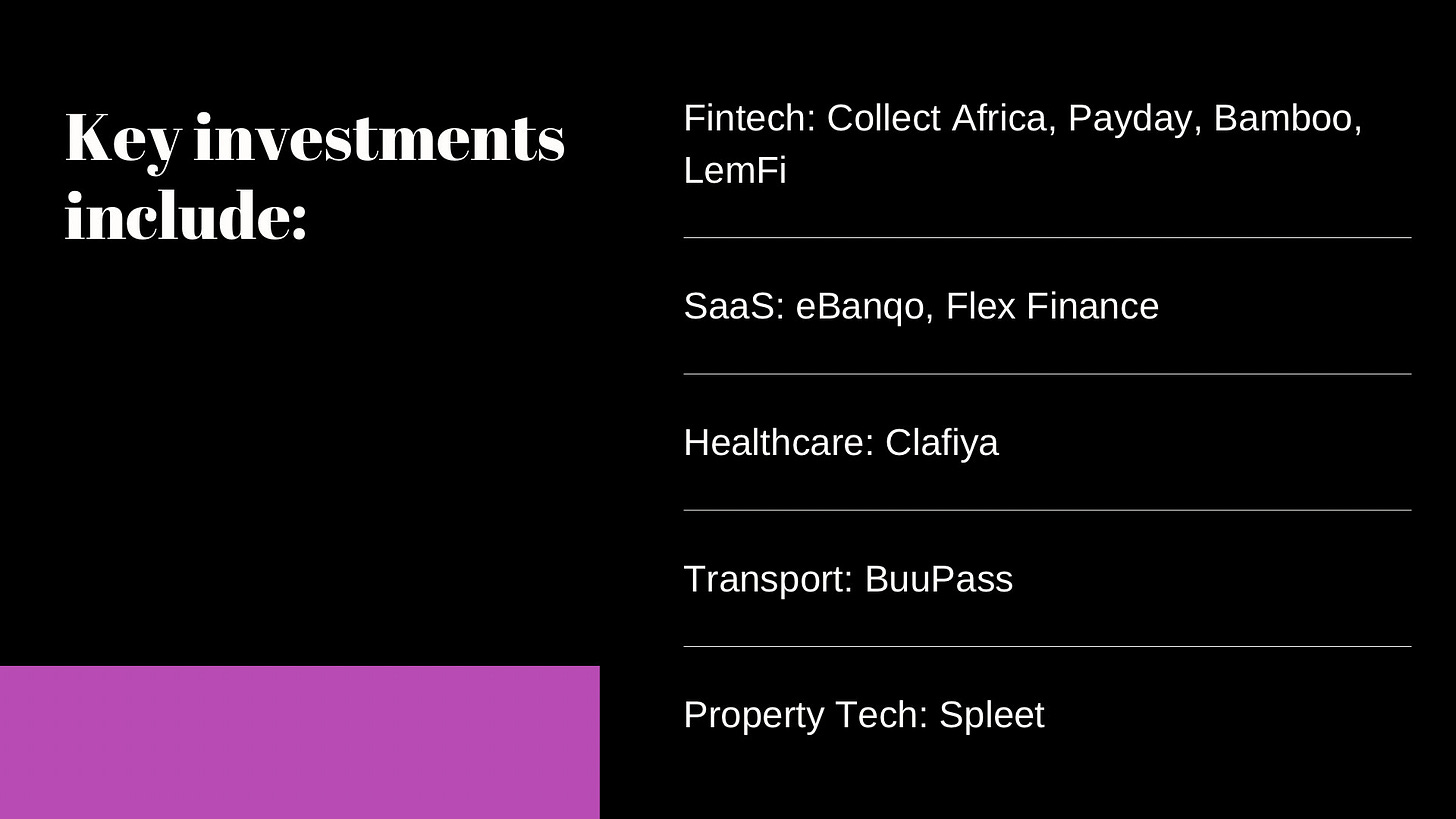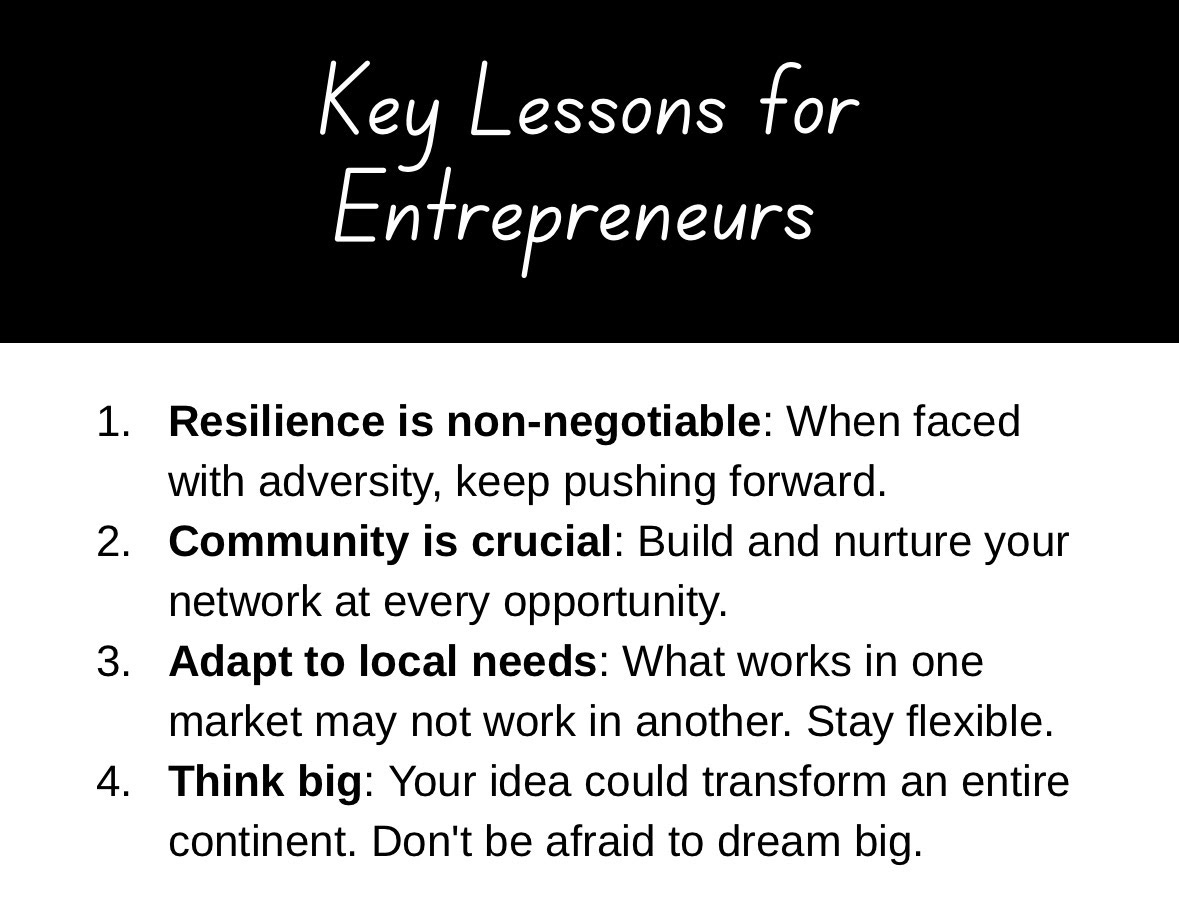From Homeless to VC Powerhouse: Meet Eunice Ajim
Eunice Ajim's story is like a rollercoaster that only goes up. This Cameroonian powerhouse went from homeless to running a VC fund that's shaking up Africa's tech scene.
Eunice Ajim's journey began in Cameroon, where she graduated high school at the tender age of 15. By 19, she had moved to the United States as an international student and completed her college education. Her first stop in the professional world? None other than tech giant Apple.
Most people would pop champagne and call it a day. Not Eunice Ajim. Like Tope Awotona in our last issue, she had that entrepreneurial itch. So she ditched the golden Apple for her first startup, DataGig - a platform designed to connect data science professionals with small businesses needing their expertise.
Spoiler alert: It wasn't all unicorns and IPOs.
DataGig aimed to address the growing demand for data analytics in the business world, providing a marketplace where small businesses could easily find and hire skilled data scientists. This startup was Ajim’s first major venture into entrepreneurship, and it came with significant challenges.
"I thought, oh my gosh, I'll become a billionaire in one year. It obviously didn't happen that way," Ajim recalls. "I struggled for the first year into entrepreneurship, but eventually figured it out and started growing the company."
That struggle was real. At one point, she found herself homeless, sleeping in her car for about a month before it was repossessed.
"I eventually just ended up struggling a lot from like building the product, finding co-founders, hiring my employees, closing a couple of customers," Ajim recounts. "I was struggling so much that I ended up becoming homeless. I got kicked out of my apartment complex."
It is, as it was then, a stark reminder of the risks inherent in entrepreneurial life. But it was in this moment of crisis that Ajim's character shone through. Instead of throwing in the towel, she doubled down.
Even at her lowest point, she maintained a semblance of normalcy and professionalism. "No matter what, I still had my $10 Planet Fitness membership," she says. "I would still show up, right? Go to the gym in the morning, go and take a good shower, put my makeup on, wear my suits. And then I would just show up to meetings."
Ajim's persistence paid off. She teamed up with an investor, pivoted to open-source software, and boom – $3.7M raised in two rounds. In three years, they went from zero to $20M+. Not bad at all for someone who was recently carless and homeless.
But she was just warming up.
Ajim Capital: Bridging the Funding Gap in Africa
During the COVID-19 pandemic, Ajim observed a critical need in Africa's burgeoning tech sector: early-stage funding for startups. This realization led to the birth of Ajim Capital, a venture capital fund dedicated to nurturing Africa's tech ecosystem.
"After a few angel investments, I just realized that there was a huge opportunity in the African market that nobody was talking about," Ajim explains. "Even me as an African in the diaspora did not know, and decided, you know what? I think the world needs to know what we are doing."
Ajim's approach to venture capital is as innovative as the startups she funds. Ajim Capital focuses primarily on Sub-Saharan Africa, with a particular emphasis on Nigeria, which accounts for 70-80% of their portfolio. Kenya is their second most important market, followed by countries like Ghana and Côte d'Ivoire.
The fund targets pre-seed and seed-stage companies, typically investing in startups with monthly recurring revenues between $5,000 and $50,000. Post-money valuations average around $3 million for pre-seed and $8-10 million for seed-stage investments.
Ajim's approach is data-driven, with the team analyzing over 300 successful business models from other emerging markets to identify promising opportunities in Africa.
The Ajim approach:
Focus on early-stage, software-specific companies: Ajim Capital targets asset-light tech startups, writing checks of $100,000 to $250,000 in pre-seed and seed companies building the digital infrastructure of the continent.
Building a supportive community: The fund isn't just about funding. It's about providing resources, mentorship, and networks crucial for success…because it takes a village to raise a unicorn.
Leveraging personal brand: Ajim has attracted over 90% of her investors through platforms like Twitter and LinkedIn, showcasing the power of personal storytelling in business.
Emphasizing networking: "Your network is your net worth," Ajim often says, underlining the importance of relationship-building in the VC world.
Ajim has developed a framework for evaluating potential investments.
Pitch Perfect: How to Catch Ajim's Eye (and Wallet)
Ajim offers valuable advice for founders looking to pitch investors:
Prepare a great pitch deck: Design matters. A well-designed, easy-to-understand deck can make a significant difference.
Focus on storytelling: During pitch meetings, don't just recite your deck. Share your story and why you're building your company.
Show traction: Ajim emphasizes the importance of showing proof of concept, with startups in her portfolio typically having monthly recurring revenue between $10,000 and $100,000.
Impacting Africa
Eunice Ajim’s commitment to supporting African tech startups took a significant leap forward when, in January of 2022, she successfully launched a $10 million fund through Ajim Capital. This fund is dedicated to providing early-stage capital to high-growth tech startups across the continent, particularly those in software-specific, asset-light sectors.
Ajim isn't just writing checks. She's on a mission to rewrite Africa's story. By providing crucial early-stage funding, Ajim Capital is enabling a new generation of tech innovators to solve local problems with cutting-edge solutions. This approach not only drives economic growth but also creates jobs and empowers communities.
"Africa has its own problems and there are so many opportunities that we could use technology to be able to solve those problems," Ajim says. "And we're just getting started. We're just at the very early stage."
Despite the current challenging market conditions, Ajim remains optimistic. While deal flow has slowed from 3-4 deals per quarter in 2022 to 1-2 deals per quarter in 2023, the fund continues to deploy capital strategically.
Ajim's transparency about the challenges of running an emerging VC fund is refreshing. "VCs don't make that much money, especially emerging VCs," she admits, highlighting the importance of being in the business for the right reasons.
Ajim's ambitions are far from modest. Her endgame? A billion-dollar VC fund focused on Africa. Yeah, you read that right. Billion with a "B." It's a vision that could fundamentally reshape the continent's tech industry and economic future.
Ajim's journey offers valuable insights for founderseverywhere.
Ajim is passionate about changing global perceptions of Africa: "African population is not very much different than all of us here in the US. We all want better education for our kids. We want good health... We are all working as hard as we possibly can to be able to get to that better standard of living."
She emphasizes that problems are opportunities, and solving a problem for a billion people across the world can lead to a billion-dollar business.
If you found Ajim's story inspiring, don't forget to share this article with your network and help us spread the word.









